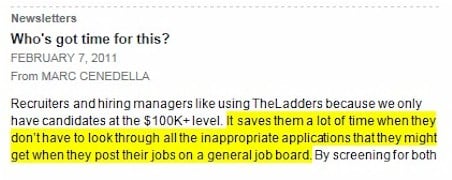In the May 13, 2014 Ask The Headhunter Newsletter, a reader says she can’t get interviews:
My husband works for a recruiting firm and suggested I reach out to you. I have been actively searching for a job for almost two years. I built my own firm from nothing to one of the largest in my city and sold it for a modest profit, and I was named a finalist for a local Business Woman of The Year award.
I received one call for an interview a couple of weeks back, but was passed by for the position because I do not have a college degree. I usually don’t get a call, just a letter in the mail or an e-mail stating that I was not selected for an interview because I do not hold the basic requirement needed for the position: a bachelor’s degree.
I have explained this to my husband several times, but he thinks I am being lazy and refusing to work. I have attached my resume for you to review. If you can shed some light on why I am not getting interviews, I would greatly appreciate it. However, if the reason is simply because I do not have the bachelor’s degree, please, let’s not waste an hour of each other’s time, or $225 for a Talk to Nick session that I will have to ask my husband for. That will create yet another fight in my household. I look forward to your response.
Nick’s Reply
I’m not contributing to a domestic fight. I accept Talk to Nick clients only when I’m sure I can help. (I judge this by asking for a 50-word description of what exactly you need help with and how you think I can help. It must be very specific.) I don’t take clients who start out worrying it’s a waste of time or money.
I looked at your resume. Your experience is stellar. But no one’s going to give you a job, because nowadays they’re not giving them out. Even to people with college degrees. You’re not getting interviews because you’re doing it all wrong. So I’ll offer you some advice because it seems your husband is a fan, and I love my fans even if I don’t know them.
(I suggest you read my PDF books, How Can I Change Careers? and Fearless Job Hunting: The Complete Collection. Together they cost far less than the $225 for an hour’s consultation on the phone with me. Each suggestion below comes from one of the books.)
- Pick 4 companies you’d love to work for. Forget about whether they have jobs open. Research them in depth. What’s their problem? What challenges do they face? Then prepare a brief business plan about how you’d help them. Don’t send it. (See How Can I Change Careers? It’s not just for career changers. It’s for anyone who wants to stand out as the profitable hire to an employer.)
- Track down a handful of people who are somehow connected to each company — employees, customers, vendors, lawyers, bankers, consultants. Call them and explain you’re considering doing business with the company and you’re doing research. (If you’re considering a job at the company, this is a true statement.) Can they give you some insight about the business and the people who run it? (Also in How Can I Change Careers? — the section about how to network.)
- One of those conversations will be good enough that you can ask for an introduction to the head of the department you want to work for. DO NOT ask for a job lead. People hate that. Instead, say, “Is there someone, preferably a manager in the X department, that you’d suggest I talk with to learn more?” (See Fearless Job Hunting, Book 3: Get in The Door Way Ahead of Your Competition.)
- Contact the manager that you’re referred to. Say that so-and-so suggested you call — and that you have a business proposition about X that you’d like to discuss. Briefly outline what’s in your biz plan, but not all of it. Request an in-person meeting. (See Fearless Job Hunting, Book 6, The Interview: Be The Profitable Hire.)
- Present your ideas in the meeting. (How Can I Change Careers? shows you how to “Put a Free Sample in Your Resume” — which in turn serves as the script for your in-person presentation.)
That’s how you’ll get a job, college degree or not. Managers sometimes create jobs for people who can show how they’ll drop profit to the bottom line. But managers don’t figure that out from resumes. You must present a plan.
One last piece of advice. Stop fooling around, pretending a degree doesn’t matter. Go get a degree. I don’t care how old you are. I recently met a guy who is 62 who just completed his B. A. A degree is not necessary, but it matters. If you think not having one is hindering you, find the time and earn it.
Job hunting and hiring are the two biggest rackets in America. Employers don’t know how to hire, and job seekers follow silly rules that don’t work. It’s why America is unemployed, degrees or not.
You can tell your husband you got a bunch of advice from me for free. Don’t have any more fights. I wish you the best.
What does it take to get a job interview nowadays? Do you need a degree? Or, what are employers really buying when they demand a degree?
: :



 he truth is, you have no idea what a company’s threshold is for taking action. Some companies will string you along — often unwittingly — for months, then take no action at all. As a headhunter who has dealt with more interviews than any job hunter ever will, I can tell you that most job opportunities go south.
he truth is, you have no idea what a company’s threshold is for taking action. Some companies will string you along — often unwittingly — for months, then take no action at all. As a headhunter who has dealt with more interviews than any job hunter ever will, I can tell you that most job opportunities go south. The Q&A section of the presentation was great — but of course, there were so many questions that we couldn’t get to them all.
The Q&A section of the presentation was great — but of course, there were so many questions that we couldn’t get to them all.












